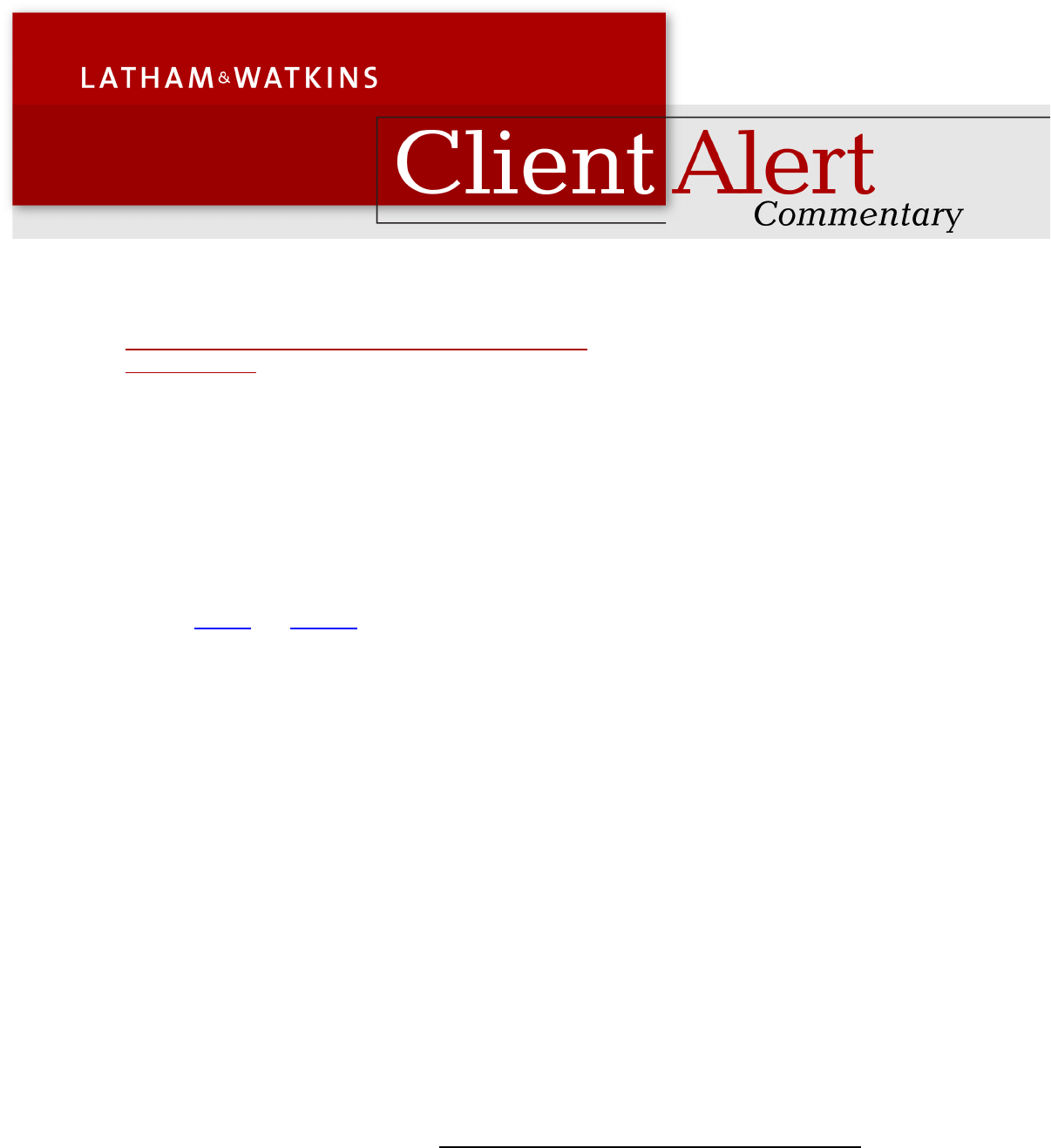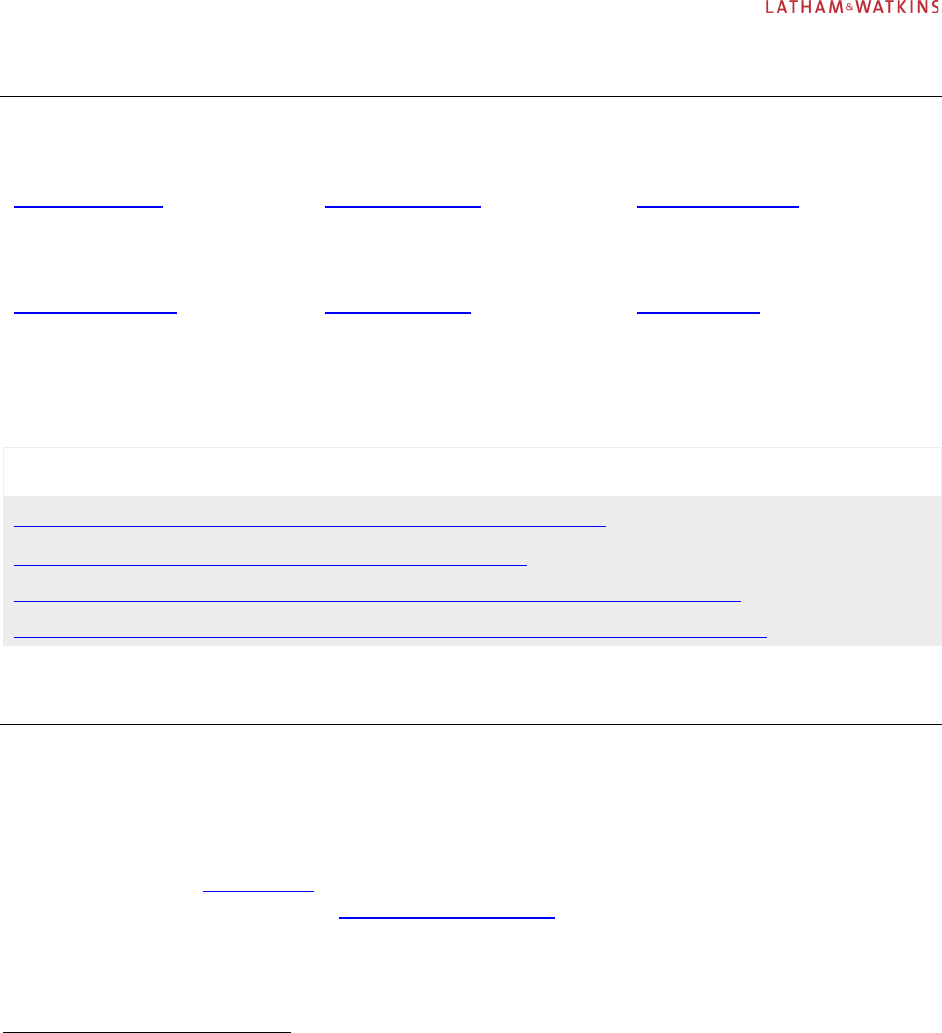
Latham & Watkins operates worldwide as a limited liability partnership organized under the laws of the State of Delaware (USA) with affiliated limited liability partnerships conducting the practice in France, Hong
Kong, Italy, Singapore, and the United Kingdom and as an affiliated partnership conducting the practice in Japan. Latham & Watkins operates in Israel through a limited liability company, in South Korea as a
Foreign Legal Consultant Office, and in Saudi Arabia through a limited liability company. © Copyright 2023 Latham & Watkins. All Rights Reserved. Under New York’s Code of Professional Responsibility,
portions of this communication contain attorney advertising. Prior results do not guarantee a similar outcome. Results depend upon a variety of factors unique to each representation. Please direct all inquiries
regarding our conduct under New York’s Disciplinary Rules to Latham & Watkins LLP, 1271 Avenue of the Americas, New York, NY 10020-1401, Phone: +1.212.906.1200.
Latham & Watkins Executive Compensation, Employment &
Benefits
Practice
December 6, 2023 | Number 3192
Important Changes to California Non-Compete Laws to Take
Effect in January 2024
Employers should take stock of restrictive covenant agreements that their current and
former workforce have signed and which remain in effect.
California recently passed two laws amending Section 16600 of the California Business and Professions
Code — SB 699 and AB 1076
— which will impact non-compete and possibly other restrictive covenant
agreements. Both laws will take effect on January 1, 2024. This Client Alert provides a summary of each
law, followed by our key takeaways and considerations for employers.
Background
Section 16600 provides that, subject to certain exceptions, “every contract by which anyone is restrained
from engaging in a lawful profession, trade, or business of any kind is to that extent void.” Though the
Section does not specifically refer to any type of restrictive covenant, California courts have interpreted
Section 16600 to prohibit post-employment non-compete agreements, as well as post-employment
customer non-solicitation agreements. More recently, one California appellate court and a few federal
courts have interpreted Section 16600 to also prohibit post-employment employee non-solicitation
agreements.
Against this backdrop, historically, California courts might have enforced restrictive covenants that would
otherwise be void under Section 16600 if, for example, the agreement was entered into by an employee
who worked out of state and the agreement was governed by, and enforceable under, another state’s
law. The two new California laws change that landscape.
Summary of the New Laws
SB 699
SB 699 amends Section 16600 to add a new Section 16600.5, which states that “[a]ny contract that is
void under this chapter is unenforceable regardless of where and when the contract was signed”
(emphasis added). More specifically, under this amendment:

Latham & Watkins December 6, 2023 | Number 3192 | Page 2
•
An employer or former employer is prohibited from attempting to enforce a contract that is void under
Section 16600 “regardless of whether the contract was signed and the employment was maintained
outside of California” (emphasis added).
•
An employer shall not enter into a contract with an employee or prospective employee that includes a
provision that is void under Section 16600.
•
An employer who violates these provisions commits a civil violation, and current, former, and
prospective employees can bring a private action to enforce the Section for injunctive relief, to recover
actual damages, or both. If the current, former, or prospective employee prevails, the amendment
provides that the individual will be entitled to recover reasonable attorney’s fees and costs.
AB 1076
AB 1076 also amends Section 16600 in two ways. First, it purports to codify the California Supreme
Court’s decision in Edwards v. Arthur Andersen LLP,
1
which interpreted Section 16600 “to void
noncompete agreements in an employment context and noncompete clauses within employment
contracts, even if that agreement is narrowly tailored, unless a [statutory] exception applies.” The
amendment instructs that the law “shall be read broadly” in accordance with the Edwards decision, but
“does not constitute a change in, but is declaratory of, existing law.”
Second, the amendment imposes on employers certain notification requirements with respect to
agreements that are void under Section 16600. Specifically:
•
The amendment again confirms that “[i]t shall be unlawful to include a noncompete clause in an
employment contract, or to require an employee to enter a noncompete agreement, that does not
satisfy an exception in [Section 16600].”
•
Employers must notify both (1) current employees and (2) former employees who were employed
after January 1, 2022, who were parties to unlawful non-compete clauses or agreements that the
noncompete clause or agreement is void. The notice must be provided no later than February 14,
2024.
•
The form of notice must be a written individualized communication, delivered to the last known
address and the email address of the current or former employee.
•
Violation of the notification requirement constitutes “an act of unfair competition” under Section 17206
of the California Business and Professions Code, which could result in a penalty of $2,500 per
violation (though it is unclear how the penalty would be calculated, e.g., per employee, per void
clause or agreement, or per overall failure to notify an employee population).
Key Takeaways and Considerations
The new laws raise a number of unanswered questions. We will closely monitor any developments,
including litigation, which we expect to see in 2024. In the meantime, our observations include the
following:
•
The limited exceptions under Section 16600 remain unchanged, i.e., restrictive covenants in the sale
or dissolution of corporations, partnerships, and limited liability companies are enforceable.
2

Latham & Watkins December 6, 2023 | Number 3192 | Page 3
•
The new laws do not address Labor Code section 925 and its exception, which permits employees
who are “in fact individually represented by legal counsel in negotiating the terms of an agreement
to designate the choice of law to be applied,” i.e., to enter into agreements governed by another
state’s law that may be more permissive towards restrictive covenants. Whether the exception
under Section 925 will be applicable to “noncompete” agreements or clauses in light of the
amendments to Section 16600 is unclear.
•
The new laws do not specifically address covenants not to solicit employees; thus, it is unclear
whether the new laws intend to “void” covenants not to solicit employees “regardless of whether the
contract was signed and the employment was maintained outside of California.” In addition, while
SB 699 refers to agreements “void under this chapter,” and may presumably incorporate prior case
law holding that covenants not to solicit customers are void, it is unclear whether AB 1076’s
notification requirements apply to covenants not to solicit customers or employees. Notably, AB 1076
references “noncompete” agreements — not agreements “void under this chapter”— though it also
states that “[t]his section shall be read broadly.”
•
The new laws do not articulate what, if any, connection to California is required to void an agreement
and trigger notification. It remains to be seen how broadly the laws will apply in practice, and whether
jurisdictional challenges may limit their effect within and outside of California. This determination may
come down to which state’s court is asked to interpret an agreement in conjunction with the new laws,
which could lead to a race to the courthouse.
While we wait for any further guidance, we recommend that employers take stock of restrictive covenant
agreements that their current and former workforce have signed and which remain in effect, and evaluate
their existing templates.
•
For employers using California-compliant forms with their California workforce, there should be
nothing further to do.
•
Employers that have a presence in California may want to exercise caution when asking an employee
outside of California, particularly a remote employee tied to a California location, to sign a non-
compete.
•
Employers may consider adding a disclaimer about the application and enforcement of non-competes
or other restrictive covenants in California, regardless of whether they have a current presence in
California.
•
Employers will likely need to review the facts and circumstances on a case-by-case basis to
determine whether existing non-compete or other restrictive covenant agreements may trigger
notification under the new laws.

Latham & Watkins December 6, 2023 | Number 3192 | Page 4
If you have questions about this Client Alert, please contact one of the authors listed below or the Latham
lawyer with whom you normally consult:
Nineveh Alkhas
nineveh.alkhas@lw.com
+1.312.876.7724
Chicago
Oswald Cousins
oswald.cousins@lw.com
+1.415.395.8887
San Francisco / Silicon Valley
Joseph B. Farrell
joe.farrel[email protected]m
+1.213.891.7944
Los Angeles
Sandra Benjamin
sandra.benjamin@lw.com
+1.212.906.1885
New York
Laura D. Waller
laura.waller@lw.com
+1.312.876.7629
Chicago
Laura Zabele
laura.zab[email protected]m
+1.213.891.8251
Los Angeles
You Might Also Be Interested In
Webcast: Managing Executive Pay in Uncertain and Volatile Times
SEC Clawback Rules: Practical Considerations and FAQs
Webcast: 2024 Proxy Season — Strategically Preparing for the Upcoming Season
New Minnesota Law Bans Most Post-Employment Non-Competes: 6 Key Takeaways
Client Alert is published by Latham & Watkins as a news reporting service to clients and other friends.
The information contained in this publication should not be construed as legal advice. Should further
analysis or explanation of the subject matter be required, please contact the lawyer with whom you
normally consult. The invitation to contact is not a solicitation for legal work under the laws of any
jurisdiction in which Latham lawyers are not authorized to practice. A complete list of Latham’s Client
Alerts can be found at www.lw.com
. If you wish to update your contact details or customize the
information you receive from Latham, visit our subscriber page.
Endnotes
1
44 Cal.4th 937 (2008).
2
See Cal. Bus. & Prof. Code sections 16601, 16602, and 16602.5.
